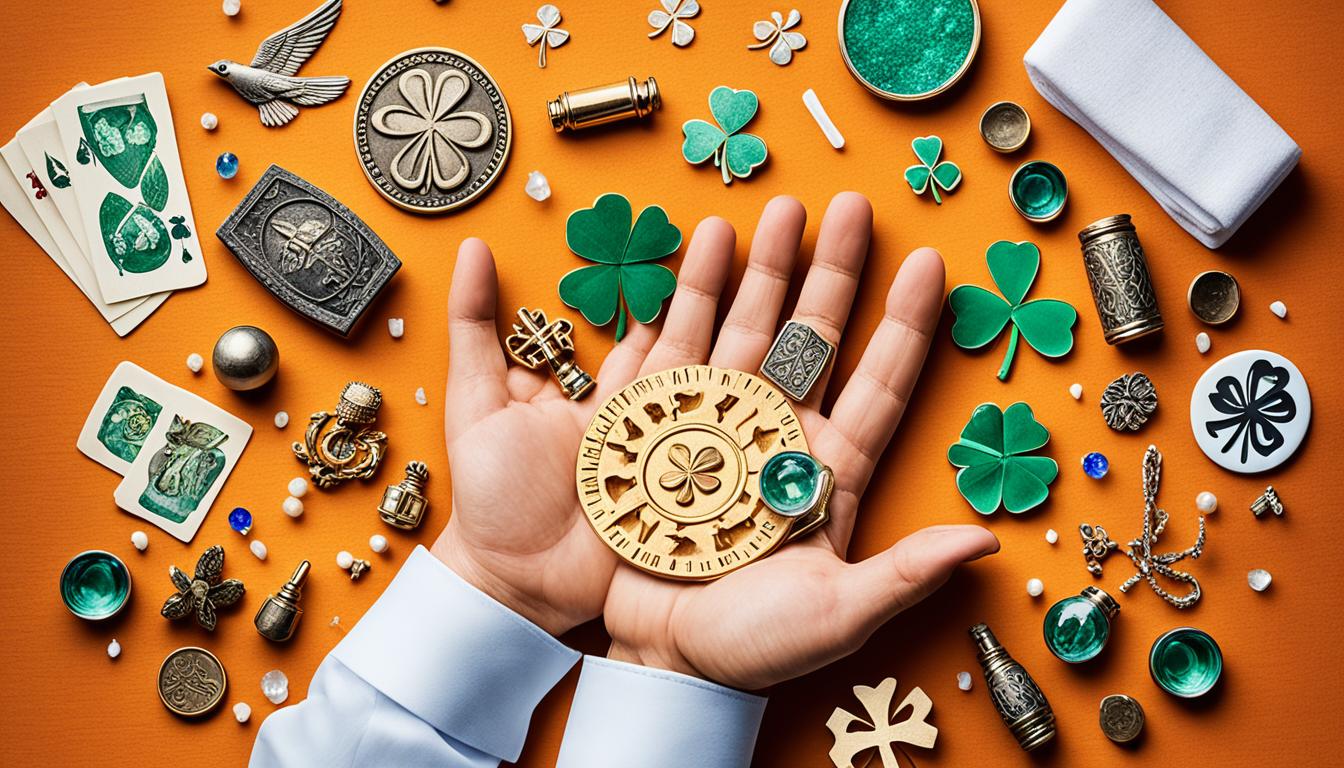Originally posted on January 24, 2024 @ 7:46 am
Many people hold superstitions and beliefs about taking off their wedding ring. Some believe that removing the ring can bring bad luck, while others associate it with negative consequences for their marriage. These superstitions and beliefs have been passed down through generations and are deeply ingrained in some cultures. However, it is important to note that these beliefs are not based on any scientific evidence and should be viewed as mere superstitions.
Key Takeaways
- Many people believe that taking off a wedding ring can bring bad luck or negative consequences for their marriage.
- These superstitions and beliefs are not based on any scientific evidence and should be viewed as mere superstitions.
- Cultural and personal beliefs play a significant role in whether individuals choose to remove their wedding ring or not.
- Practical considerations, such as comfort or safety, may also influence the decision to take off a wedding ring.
- Ultimately, whether to remove a wedding ring or not is a personal decision that should be based on individual beliefs and circumstances.
Wedding Ring Superstitions
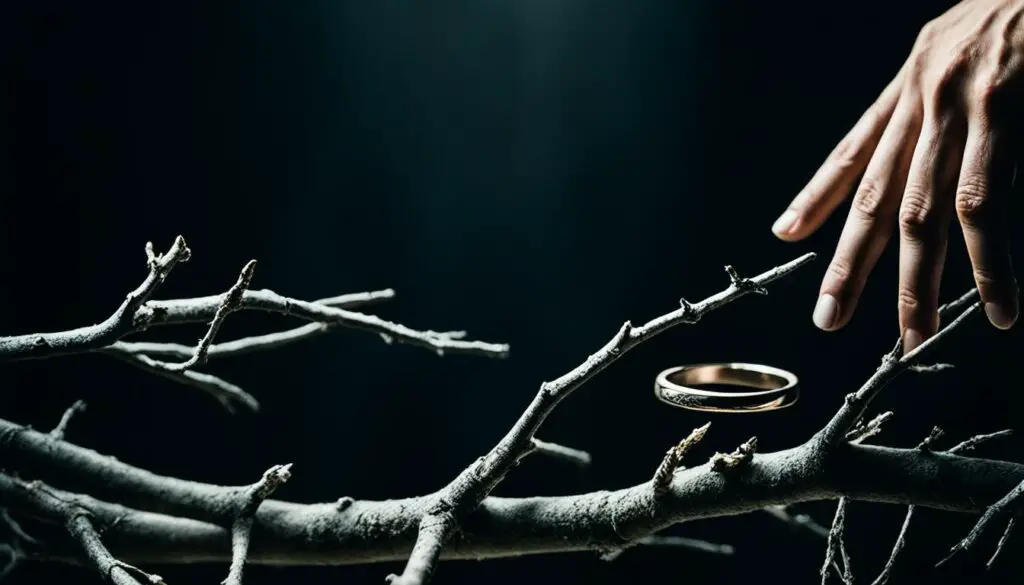
When it comes to wedding rings, there are several superstitions and beliefs surrounding the consequences of taking them off. Some people believe that removing the ring can bring about negative outcomes for the marriage, while others associate it with potential infidelity or a disruption in the bond between spouses.
Superstition 1: One common belief is that taking off a wedding ring can lead to a failed or unhappy marriage. This belief suggests that by removing the symbol of commitment, the marriage itself becomes vulnerable to negative consequences.
Superstition 2: Another superstition is that removing the ring can attract infidelity. According to this belief, taking off the wedding ring opens the door for temptation and may invite unfaithfulness into the relationship.
Superstition 3: Some individuals believe that removing the wedding ring disrupts the bond between spouses. They think that the continuous presence of the ring serves as a constant reminder of the commitment and love shared between partners. Without it, they fear that the foundation of the marriage may be weakened.
It is important to note that these superstitions are not grounded in reality and should not be taken seriously. Every relationship is unique, and the presence or absence of a wedding ring should not determine its fate. Trust, communication, and commitment are the pillars of a successful marriage, not the mere presence of a piece of jewelry.
“The belief that removing a wedding ring will bring about negative consequences is purely a superstition and holds no factual basis. Marriage depends on the love, respect, and dedication of the partners, not the presence of a ring.”
Debunking the Superstitions
It is essential to distinguish between superstitions and reality. While wedding ring superstitions may have been deeply ingrained in certain cultures, they should not dictate the course of a marriage. It is the individuals within the relationship who play the key role in fostering love, trust, and happiness.
Now let’s take a closer look at some of the consequences associated with taking off a wedding ring and debunk them:
| Superstition | Reality |
|---|---|
| Removing the ring leads to a failed or unhappy marriage. | The success of a marriage is not determined by the presence or absence of a ring. It depends on the commitment, communication, and mutual respect between partners. |
| Taking off the ring attracts infidelity. | Infidelity is influenced by personal choices and values, not the absence of a wedding ring. Trust and faithfulness are built through open communication and a strong emotional connection. |
| Removing the ring disrupts the bond between spouses. | The strength of a marriage lies in the love and support partners provide each other, not in the presence of a physical symbol. The bond between spouses is nurtured through shared experiences, loyalty, and commitment. |
Instead of focusing on superstitions, it is important for couples to prioritize open communication, trust, and commitment in their marriage. The decision to wear or remove a wedding ring should be based on personal preferences, comfort, and practical considerations rather than superstition.
Myths and Superstitions
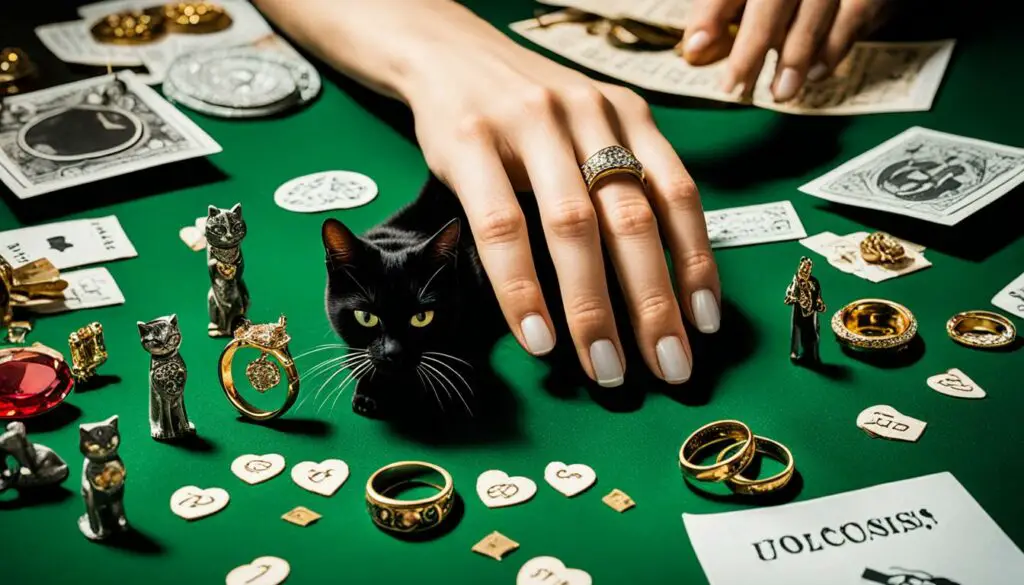
Wedding rings have long been intertwined with myths and superstitions. These beliefs, although not grounded in reality, have persisted through generations and continue to influence people’s perceptions. Let’s explore some of the most common myths and superstitions surrounding wedding rings.
A Tight Ring and Its Symbolism
One prevalent belief is that a tight wedding ring symbolizes a stifled or strangled relationship. Some argue that the discomfort caused by a tight ring reflects the constriction of love and affection within a marriage. However, it is essential to remember that the size of a ring may change over time due to various factors, such as weight fluctuations or temperature. The perceived symbolism behind a tight ring should be taken with a grain of salt and not seen as an omen of relationship troubles.
A Loose Ring and Its Omens
Conversely, a loose wedding ring is often seen as a foreshadowing of separation or forgetfulness. The belief suggests that a loose ring may easily slip off, indicating a lack of commitment or the potential loss of a partner. However, it is important to consider that ring size can be affected by factors beyond the relationship itself, such as weight loss or changes in finger size. Therefore, attributing negative consequences to a loose wedding ring is merely a superstition without any basis in reality.
Trying on a Wedding Ring
Another myth dictates that trying on a wedding ring before the big day can lead to an unsatisfactory marriage. This belief is rooted in the notion that wearing the ring prematurely may disrupt the marriage’s harmony or result in an eventual separation. However, it is crucial to understand that trying on a ring is often a practical step in the wedding planning process—ensuring a proper fit and selecting the ideal design. The belief that this simple action can endanger a marriage lacks any factual evidence.
“Myths and superstitions surrounding wedding rings often stem from cultural traditions and personal beliefs. However, it is important to approach these beliefs with skepticism and not let them dictate decisions that are personal and meaningful.”
While these myths and superstitions may have deep cultural and historical roots, it is essential to view them with a critical eye. Personal beliefs should guide decisions related to wedding rings, rather than adhering to unfounded superstitions. Remember, your wedding ring is a symbol of love, commitment, and personal significance – don’t let myths and superstitions diminish its true meaning.
Continue reading to uncover more fascinating facts about wedding ring traditions and explore other myths surrounding engagement rings.
Ancient Traditions and Symbolism
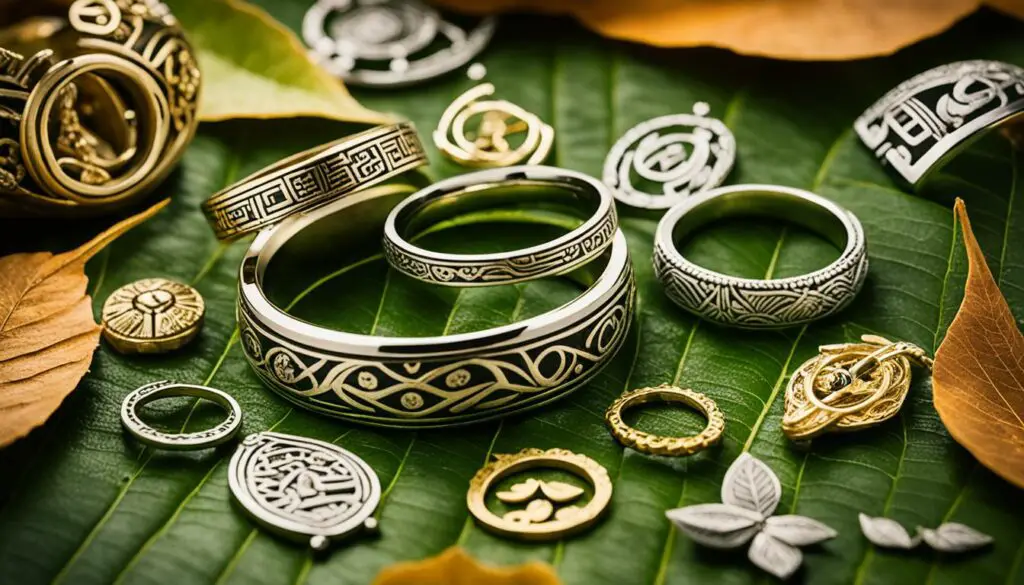
Wedding rings hold significant symbolism in many cultures. They are traditionally made of gold or silver to symbolize trust, love, and faith in one’s partner. The choice of gold for wedding rings is rooted in its preciousness and enduring beauty. Gold is a symbol of wealth and prosperity, making it a fitting representation of the value and commitment of marriage. The sparkle and luster of gold also reflect the radiant and everlasting nature of love.
Another fascinating tradition associated with wedding rings is the practice of wearing them on the left hand. This custom originated from a superstition that a specific vein, known as the “vena amoris” or the “vein of love,” ran directly from the fourth finger on the left hand to the heart. While there is no scientific evidence to support this belief, it has become a widely accepted tradition in Western cultures.
| Symbolism of Wedding Rings | Reason |
|---|---|
| Trust | To symbolize the trust and faithfulness between partners |
| Love | To represent the deep affection and emotional connection in a marriage |
| Commitment | To signify the lifelong promise and dedication to one another |
| Unity | To highlight the union and partnership of two individuals |
While wedding rings may vary in their designs and materials across different cultures, their symbolism remains consistent. They serve as a tangible reminder of the love and commitment shared between spouses, serving as a constant symbol of their bond.
Superstitions About Other People’s Rings
While many superstitions revolve around wearing one’s own wedding ring, there are also beliefs surrounding wearing someone else’s ring. Specifically, if the ring comes from a failed marriage, some believe that wearing it can bring bad luck and negative energy into their own marriage.
It is thought that the negative vibes and energy associated with a broken marriage can be passed on to the wearer, potentially leading to an unsuccessful marriage of their own. This belief stems from the idea that objects can carry the emotions and experiences of their previous owners.
However, it’s important to note that these superstitions are not based on any scientific evidence and should be viewed as purely symbolic. They rely heavily on the power of perception and personal beliefs. It’s always up to individuals to decide whether they want to attribute any significance to such beliefs.
Engagement Rings Passed Down as Family Heirlooms
It’s worth noting that these superstitions surrounding other people’s rings don’t typically apply to engagement rings passed down as family heirlooms. In fact, these heirloom rings are often seen as precious symbols of love, tradition, and continuity within a family.
When an engagement ring is passed down from one generation to another, it is believed to carry the blessings, well-wishes, and joy of the previous marriages in the family. Instead of being associated with bad luck, these rings are seen as bringing happiness and luck to the wearer’s own marriage.
Ultimately, whether someone chooses to wear another person’s wedding ring or engagement ring is a personal decision influenced by cultural customs, individual beliefs, and personal preferences. As with all superstitions, it’s essential to remember that they hold varying degrees of significance and should be interpreted with an open mind.
Pregnancy and Ring Superstitions

When it comes to pregnancy, there are countless superstitions and old wives’ tales that can captivate expecting parents. One intriguing belief involves the movement of a wedding ring around the pregnant belly, which supposedly has the power to predict the gender of the baby.
According to this superstition, if a wedding ring swings in a circular motion above the belly, it is said to indicate that the baby will be a girl. On the other hand, if the ring moves back and forth, it is believed to be a sign that the baby will be a boy. While this may seem like a fun and mystical way to predict the baby’s gender, it’s important to note that there is no scientific evidence to support this claim.
Parents-to-be often find joy in engaging with these traditional superstitions, as they add a touch of excitement and anticipation to their journey. However, it’s important to remember that the only accurate way to determine the gender of a baby is through modern medical techniques, such as ultrasound scans.
Ultrasound technology provides expectant parents with a reliable and accurate method of determining the gender of their baby. In contrast, the wedding ring superstition serves as nothing more than a lighthearted tradition passed down through generations. While it can be a fun game to play, it should not be taken as a reliable indicator of the baby’s gender.
It’s important for expecting parents to embrace the joy and excitement of their pregnancy journey, whether they choose to participate in superstitions or not. Ultimately, the most meaningful aspect of this special time is the health and well-being of both the mother and the baby.
Engagement Ring Superstitions
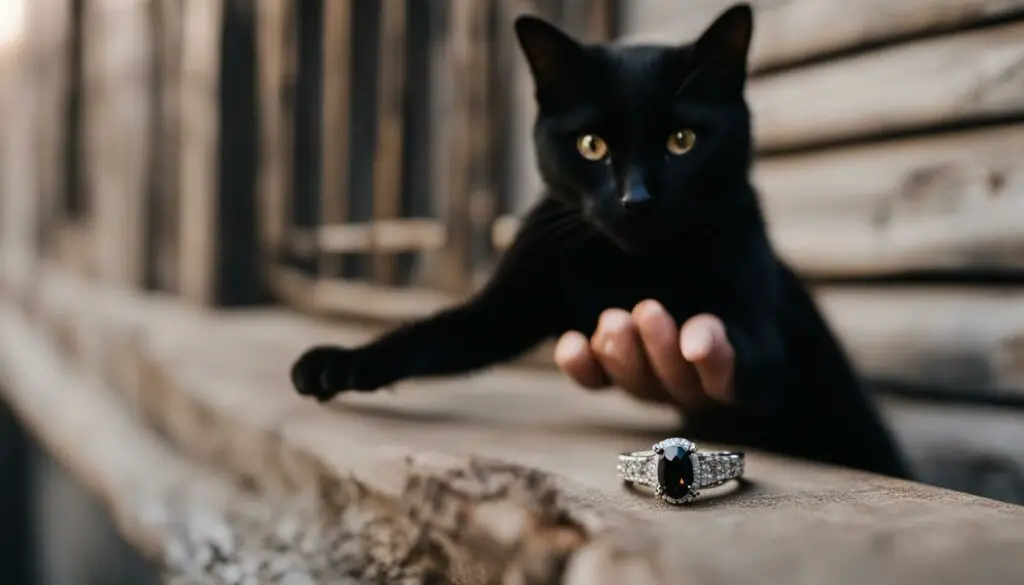
While wedding rings have their fair share of superstitions, engagement rings also hold deep-seated beliefs and meanings. These beliefs surrounding engagement rings often vary based on cultural traditions and personal interpretations.
One commonly held belief is that it is bad luck to try on someone else’s engagement ring. This superstition stems from the idea that wearing another person’s ring could transfer negative energy or bad luck to the wearer. It is thought that the bond between the engaged couple is unique and personal, and wearing someone else’s ring may disrupt that connection.
On the other hand, some view passing down an engagement ring as a family heirloom as a symbol of good luck and happiness. This belief suggests that the history and love associated with the ring can bring blessings to the future wearer’s own marriage. It is seen as a way to honor family traditions and strengthen the bond between generations.
Engagement rings also hold symbolic value beyond superstitions. They are often seen as a representation of love, commitment, and the promise of marriage. The act of proposing with an engagement ring is considered a significant and special moment in many cultures, signifying the intention to spend a lifetime together.
Engagement ring superstitions and beliefs about their meaning and significance vary greatly. Some people adhere to these beliefs strongly, while others may view them as mere traditions or personal preferences. Ultimately, the symbolism and superstitions associated with engagement rings add an extra layer of meaning to this cherished tradition.
Practical Reasons for Taking off a Wedding Ring
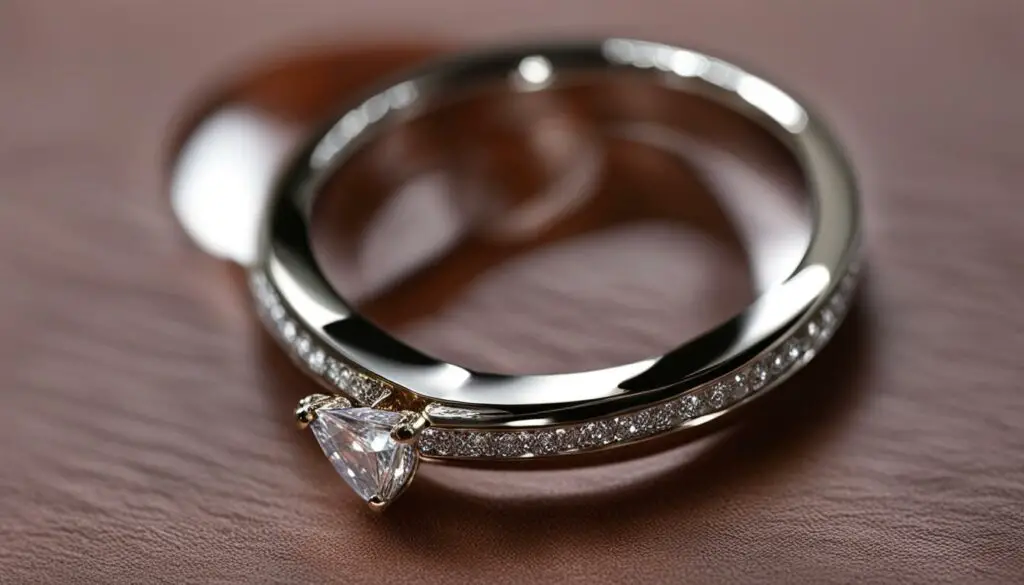
While there may be superstitions and beliefs surrounding wedding rings, there are also practical reasons why people choose to take off their ring at times. These reasons can vary from discomfort caused by an improperly sized ring to engaging in activities that require its removal. It is important to prioritize safety, comfort, and practicality when deciding whether to take off a wedding ring.
Discomfort Caused by an Improperly Sized Ring
One common reason for removing a wedding ring is discomfort or irritation caused by wearing an improperly sized ring. A ring that is too tight can result in finger swelling and discomfort, while a ring that is too loose may slip off and risk being lost. In such cases, taking off the ring temporarily can alleviate discomfort and prevent any potential damage to the ring or finger.
Activities That Require Removal of a Wedding Ring
Engaging in certain activities can present risks to both the ring and the wearer, making it necessary to take it off. For example, activities such as working out, playing sports, or swimming can put the ring at risk of damage or loss. Taking off the wedding ring beforehand can protect it from scratches, dents, or accidental slips. It is important to consider the nature of the activity and the potential risks involved before deciding to remove the ring.
Personal Preferences and Comfort
Ultimately, the decision to take off a wedding ring can also be influenced by personal preferences and comfort. Some individuals may simply find wearing a ring on a daily basis inconvenient, especially if their work involves frequent handwashing, handling certain materials, or wearing gloves. Removing the ring in such situations can enhance comfort and ease of movement.
While it is important to respect the significance of wedding rings and the meaning they hold in a marriage, it is equally crucial to prioritize practical considerations and personal comfort. Taking off a wedding ring should not be seen as a violation of the marriage contract, but rather as a sensible choice driven by individual circumstances and needs.
| Reasons to Take off a Wedding Ring |
|---|
| Discomfort caused by an improperly sized ring |
| Engaging in activities that can damage the ring |
| Personal preferences and comfort |
Taking Off a Wedding Ring and Personal Beliefs
When it comes to the decision of taking off a wedding ring, it is a personal choice that should be discussed between spouses. This decision is influenced by personal beliefs, cultural preferences, and practical considerations. While some individuals hold the belief that removing the wedding ring can bring bad luck or be seen as a violation of the marriage contract, it is important to understand that these beliefs are subjective and not supported by factual evidence.
Personal beliefs about taking off a wedding ring can vary greatly, depending on an individual’s upbringing, cultural background, and personal experiences. In some cultures, the wedding ring is seen as a symbol of commitment and fidelity, and removing it may be viewed as a breach of trust. However, in other cultures, the act of temporarily removing the ring for specific situations or activities may be accepted or even encouraged.
It is essential to recognize that cultural preferences surrounding wedding rings can differ significantly. For example, in some cultures, wearing the wedding ring on the right hand is customary, while in others, it is worn on the left hand. These cultural differences highlight the subjective nature of beliefs associated with wedding rings and the various ways in which they can be perceived.
Ultimately, the decision to take off a wedding ring should be based on open communication and mutual agreement between spouses. It is crucial to respect each other’s personal beliefs and preferences while considering the practical aspects of wearing a ring, such as comfort and safety. Whether a person chooses to keep the wedding ring on or take it off, it should be a decision made with respect, understanding, and love.
Conclusion
Wedding ring superstitions and beliefs about taking off the ring have been deeply ingrained in some cultures for generations. However, it is important to approach these beliefs with skepticism and recognize them as mere superstitions. There is no scientific evidence to support the notion that taking off a wedding ring brings bad luck or causes a failed marriage. These beliefs should not dictate our actions or decisions.
Ultimately, the decision to wear or remove a wedding ring should be based on personal beliefs, comfort, and practical considerations. It is essential to prioritize individual preferences and practicality when deciding whether to take off a wedding ring. Whether it’s due to discomfort, specific activities, or personal preferences, it is entirely acceptable to remove a wedding ring when necessary.
Debunking these wedding ring myths frees us from unnecessary worry and allows us to embrace our own choices without fear. Let us celebrate the symbolism and traditions attached to wedding rings, but also remember that it is our love, commitment, and actions that truly define the strength of our marriages. It is time to let go of superstitious beliefs and trust in our own judgment and love for our partners.
FAQ
Is it bad luck to remove your wedding ring?
No, the belief that removing a wedding ring can bring bad luck is a superstition without any scientific evidence.
Are there consequences of taking off a wedding ring?
There are no concrete consequences associated with taking off a wedding ring. It is a personal choice influenced by comfort and practicality.
What are the myths and superstitions surrounding wedding ring removal?
There are various myths, such as believing that a tight or loose wedding ring symbolizes the health of the relationship. However, these beliefs are subjective and not supported by factual evidence.
What is the symbolism behind wedding rings?
Wedding rings are traditionally made of gold or silver to symbolize trust, love, and faith in one’s partner. Wearing wedding rings on the left hand is a common practice derived from the belief in a vein that leads directly to the heart.
Is it bad luck to wear someone else’s wedding ring?
Wearing someone else’s wedding ring, particularly from a broken marriage, is associated with negative energy according to superstitions. However, family heirloom engagement rings are seen as bringing joy to the wearer’s own marriage.
Can the way a wedding ring turns around the pregnant belly indicate the baby’s gender?
According to a superstition, if a wedding ring swings in a circular motion, it is believed to be a sign of a girl, while back-and-forth motion indicates a boy. However, this is purely a fun and mystical belief, not a scientifically proven method of predicting the baby’s gender.
Are there superstitions surrounding engagement rings?
Superstitions vary, but some claim that it is bad luck to try on someone else’s engagement ring, while others view passing on an engagement ring as a family heirloom as a symbol of good luck and happiness.
What are the practical reasons for taking off a wedding ring?
Practical reasons for removing a wedding ring can include discomfort or irritation caused by an ill-fitting ring, activities that may damage the ring (like working out or swimming), or personal preferences and comfort.
Should the decision to take off a wedding ring be based on personal beliefs?
Yes, the decision to wear or remove a wedding ring should be based on personal beliefs, cultural preferences, and practical considerations. There is no factual evidence supporting the belief that taking off a wedding ring brings bad luck or causes a failed marriage.
Are wedding ring superstitions rooted in ancient traditions?
Yes, wedding ring superstitions have been passed down through generations and are deeply ingrained in some cultures. However, it is important to approach these beliefs with skepticism and recognize them as mere superstitions.
Do wedding ring beliefs and superstitions have any scientific basis?
No, wedding ring beliefs and superstitions do not have any scientific basis. They are subjective and should be viewed as cultural traditions and personal interpretations rather than factual evidence.
